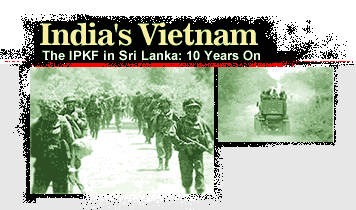
|
|
||
|
|
||
|
HOME |
NEWS | SPECIALS
|
||
|

|
|
|
The day the elected government was in place, the military role of the IPKF was over
Ten years down the line, he is still evasive when you ask him who is to blame for rushing in soldiers to the island nation without proper briefing, inadequate logistics and misplaced intelligence inputs. And he feels the Indian Peace Keeping Force completed most of its task. Lt Gen Kalkat, however, admits that it indeed was an ill-equipped and unprepared army that he was put in charge of. He answered Josy Joseph's queries: General, do you think the withdrawal was well-timed? Had the IPKF completed it task? The IPKF went there as part of the Indo-Sri Lanka Accord signed in 1987. Our role was to assist the democratic implementation of the Accord and prepare the ground for that. And the test of that was to create conditions such that an election could be held in the north and the east. In October-November of 1988, elections were held. Basically about a year after the Accord, the conditions were created for the elections. The second part of the agreement was that the Sri Lankan government would fulfill its obligations under the Accord. Primarily, devolution of power. And certain safeguards. In lieu of that the Tamils and LTTE, which was the most militant party, would give up arms. That was part of the agreement itself. That after the conditions were created for democratic process to go through, elections will be held. Tamils would vote. That was done, and elections were held. If you recall, it was the highest ever turnout in the Sri Lankan history. It was over 60 per cent. That was pretty good for any election anywhere, even in our own country. And the Tamil party, the EPRLF, won. The LTTE boycotted the election. The other parties also participated. The Sri Lankan parties, the Sinhala parties, too. The Sri Lanka Muslim Party also participated. With the result that an election could be held and we could have the provisional assembly. The next part after that had to be the proclamation by the [Sri Lankan] president to merge the two provinces because the demand was for a single homeland, not a divided homeland. And it did not happen soon.
The moment it became so, they elected a chief minister, the leader of the party Eelam People's Revolutionary Liberation Front, Varadaraja Perumal. Now that was all right. Then the most important thing to define was his rights to function as the provincial government, and that is where the role of the Sri Lankan government, bureaucracy and political hierarchy come into it. They were holding on to it, hedging on it. The day the militancy was put under control and elections were held and the elected government was in place, the military role of the IPKF was over. A military man thereafter had no role. But you stayed on. Because of the peculiar conditions of the north-eastern government. The police force was non-existent [there]. Actually, the police force had disintegrated. The reason is also obvious: the police primarily consisted of Sinhalese. The area was predominantly Tamil -- in fact the northern part was 90 per cent Tamil. And the eastern part was 33 per cent Tamil. It was 1/3 Tamil, 1/3 Sinhala, 1/3 Muslims. Muslims speak Tamil, but they do not identify themselves as Tamils. So there were no Tamils and it would have then been not practical to have a police force entirely manned by Sinhalese. A police force had to be created; it was created. And certain notification had to be done. All these things took time. So we were assisting to that extent. The police force became fairly functional, but unfortunately the powers of the North-Eastern Provincial Government were not devolved upon this government. So, the police force took orders from Colombo. The chief minister had no power even on one simple constable in the entire north-eastern province. So his credibility was getting questioned. He had no financial powers, in fact not even the powers of a municipal corporator. Because all the powers came under the centre, that is part of the devolution that had to take place. After that it had to be promulgated. It is something like in Delhi you have the Rent Control Act passed; the government hasn't yet notified the act for implementation. Similar thing they were doing there. And it was a very deliberate pattern there in Colombo because they wanted to go back on some ingredients of Indo-Sri Lanka Accord. We could not have gone back on it, because we had committed ourselves and we were there, and India was committed to the rights of the Tamils. But Premadasa had no intention of doing so. When he found that a government [in India] which had come on a platform that it would withdraw [the IPKF], all that he had to do was to carry on delaying it till we withdrew. Once we had withdrawn then it was a different story because as you are aware, before we withdrew, Premadasa announced that he had opened talks with the LTTE and they have become the best of friends and that they will never fight again. And they have withdrawn all defensive postures and therefore the IPKF, the third party, was not required and it should go home.
ON TO PART 4
|
|
|||
|
HOME |
NEWS |
BUSINESS |
MONEY |
SPORTS |
MOVIES |
CHAT |
INFOTECH |
TRAVEL SINGLES | NEWSLINKS | BOOK SHOP | MUSIC SHOP | GIFT SHOP | HOTEL BOOKINGS AIR/RAIL | WEATHER | MILLENNIUM | BROADBAND | E-CARDS | EDUCATION HOMEPAGES | FREE EMAIL | CONTESTS | FEEDBACK |
||||